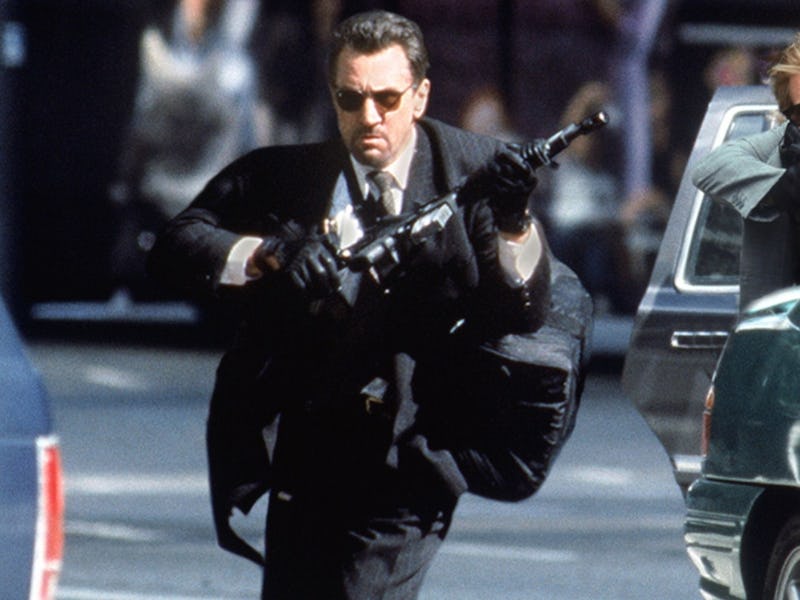The Most Operatic Heist Film Ever Just Got Added To Netflix
The action is the juice.

It begins with an overture. The studio credits, the top-billed talent, and the title, simple white text vibrating like a tense engine. Elliot Goldenthal’s score, with atmospheric strings from the Kronos Quartet, sings over the opening shots of Los Angeles waking up. A Metro Rail train glides through the darkness before our bank-robbing antihero Neil McCauley (Robert De Niro) disembarks and walks through a busy hospital. The gears are turning on a story with an inevitable conclusion, even before we’ve met Neil’s double, the only person in the city (world?) who gets how and why he operates, and is therefore fated to destroy him: LAPD lieutenant Vincent Hanna (Al Pacino). This is Michael Mann’s Heat, now available on Netflix, and it’s the closest a Hollywood action film has gotten to an opera.
Many action movies have been dubbed “operatic,” even if it’s difficult to pin down exactly what the term means. Does it refer to heightened, finely choreographed, sensory-rich romps like the John Wick sequels? Does it mean a film where movement and emotions feel driven by a full-bodied, inescapable score, like Mad Max: Fury Road or Once Upon a Time in the West? What about the magnified emotions and rich melodrama of John Woo’s “heroic bloodshed” films, where the betrayal, heartbreak, and loyalty coursing through Bullet in the Head and A Better Tomorrow match the volume of gunshots and blood spurts? Actual opera performances have even been key setpieces to American crime and action films: if you were to combine the well-oiled machinery of Rogue Nation with the haunted romance (and Al Pacino-ness) of The Godfather Part III, you might get something close to Heat.
But while those qualifiers fit the visual and emotional frequencies of Mann’s LA epic, Heat is the rare heist film designed like an opera. The story is filled with melodrama, scorned lovers, bitter geniuses, and danger-courting cads. As music critic Corinna da Fonseca-Wollheim writes, this heightened reality draws us in rather than alienates us, as “opera can both condense life and blow it up.”
Albeit not always this literally.
This is core to Mann’s ethos, as the director adjusts the volume and tempo of each and every scene with the fine touch usually associated with a rare car mechanic or gifted composer. The color palette’s rich blue hues and silvery grays feel like painted backdrops, even though many of Heat’s diners, industrial sites, and concrete highways have a familiar, grounded dreariness. The world is tired and drab; it’s the fiery, romantic characters that turn Los Angeles into an opera house-worthy spectacle.
Across nearly three hours, Heat crescendos with bass-boosted tactical shootouts, crushing emasculations, and treachery of smaller, weaker men less committed to either McCauley or Hanna’s causes. In the case of the dazzling blonde hothead Chris (Val Kilmer) and his wife Charlene (Ashley Judd), what looks like a romantic betrayal reveals itself to be the most sophisticated and understated acts of loyalty in the whole film. Charlene warns him away from the cops with a slight hand gesture that takes advantage of the cinematic close-up, but had it been magnified on an opera’s stage, it would have felt just as triumphant.
The fantasy tale of a noble cop and robber isn’t one that allows for great character growth or sudden change. Instead, our heroes confront their inner faults through the distorted reflection of their opposite, usually from a great distance. Despite professing judgment, neither man knows the right moment to walk away from their high-stakes mission. In other words, their fate is written in the stars. They’re helpless to their inner nature: had Heat’s opening titles featured a chorus, they would have sung of the tragedy of two exceptional men brought together by the dutiful desire to vanquish one another.
Even in its quieter moments, Heat has a clear sense of style.
It’s difficult to know where exactly in Heat you could substitute opera numbers, but efforts should definitely be made. What about a comic song, intermezzo style, of Hanna singing about the merits of a great ass? Or an aria from McCauley instructing the bank customers and employees what to do during the robbery, which transitions into a ballet number as the iconic shootout spills onto West 5th Street?
The film’s final shot, of a collapsed, inert McCauley clasping hands with an exhausted, victorious Hanna, begs for the rapturous resolution of the opera’s finale — the defeated McCauley faces the audience as Hanna looks up to the stars that wrote their fates, the actors frozen in place and waiting for the standing ovation that cues their final bows. Heat got to be the best of its genre thanks to not just Mann’s technical and dramatic skill, but a hyperliterate understanding of what makes an art form sing.
Heat is streaming on Netflix.